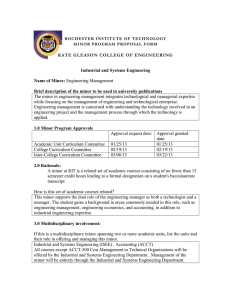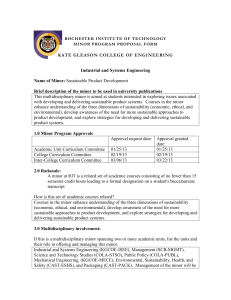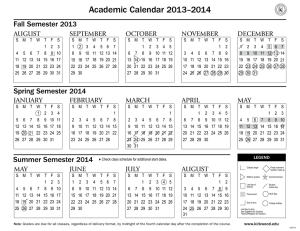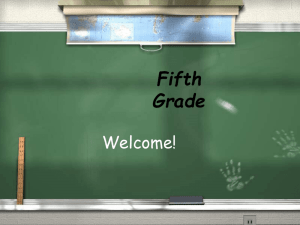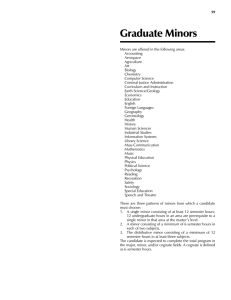Industrial Engineering
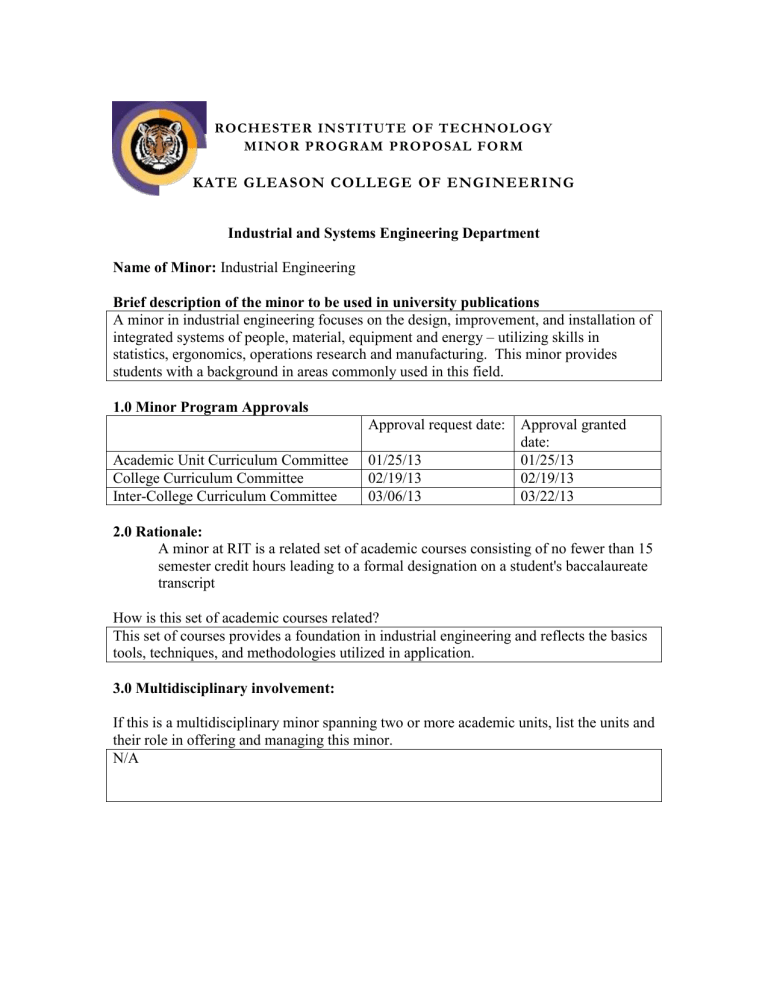
ROCHESTER INSTITUTE OF TECHNOLOGY
MINOR PROGRAM PROPOSAL FORM
KATE GLEASON COLLEGE OF ENGINEERING
Industrial and Systems Engineering Department
Name of Minor: Industrial Engineering
Brief description of the minor to be used in university publications
A minor in industrial engineering focuses on the design, improvement, and installation of integrated systems of people, material, equipment and energy – utilizing skills in statistics, ergonomics, operations research and manufacturing. This minor provides students with a background in areas commonly used in this field.
1.0 Minor Program Approvals
Approval request date: Approval granted date:
Academic Unit Curriculum Committee 01/25/13
College Curriculum Committee 02/19/13
01/25/13
02/19/13
Inter-College Curriculum Committee 03/06/13 03/22/13
2.0 Rationale:
A minor at RIT is a related set of academic courses consisting of no fewer than 15 semester credit hours leading to a formal designation on a student's baccalaureate transcript
How is this set of academic courses related?
This set of courses provides a foundation in industrial engineering and reflects the basics tools, techniques, and methodologies utilized in application.
3.0 Multidisciplinary involvement:
If this is a multidisciplinary minor spanning two or more academic units, list the units and their role in offering and managing this minor.
N/A
4.0 Students ineligible to pursue this minor:
The purpose of the minor is both to broaden a student's college education and deepen it in an area outside the student’s major program. A minor may be related to and complement a student’s major, or it may be in a completely different academic/professional area. It is the responsibility of the academic unit proposing a minor and the unit’s curriculum committee to indicate any home programs for which the minor is not a broadening experience.
Please list below any home programs whose students will not be allowed to pursue this minor, provide the reasoning, and indicate if this exclusion has been discussed with the affected programs:
All matriculated undergraduates in engineering and engineering-related programs (i.e., consistent with math/science requirements) are eligible, except industrial engineering students.
5.0 Minor Program Structure, Sequence and Course Offering Schedule:
Describe the structure of the proposed minor and list all courses, their anticipated offering schedule, and any prerequisites.
All minors must contain at least fifteen semester credit hours;
Minors may be discipline-based or interdisciplinary;
In most cases, minors shall consist of a minimum of two upper division courses
(300 or above) to provide reasonable breadth and depth within the minor;
As per New York State requirements, courses within the minor must be offered with sufficient frequency to allow students to complete the minor within the same time frame allowed for the completion of the baccalaureate degree;
Provide a program mask showing how students will complete the minor.
Narrative of Minor Program Structure:
The Industrial Engineering minor will consist of 15 credit hours, at least three core courses and no more than two elective courses.
As an example, students may complete the minor by following the sequence below.
However, given the flexible structure of the course, multiple program masks exist.
3 rd Year 4 th Year 5 th Year
IE Minor Core #1
(e.g., ISEE 301)
IE Minor Core #2
(e.g., ISEE 250)
IE Minor Core #3
(e.g., ISEE 410)
IE Minor Core
( if only one taken in 3rd year )
IE Minor
Elective #1
IE Minor
Elective #2
2
Course Number & Title SCH Required Optional Fall Spring Biennial? Prerequisites*
Core Course (choose at least three)
ISEE-250 Engineering
3 Y Y None
Economy
ISEE-301 Operations
Research
ISEE-323 Facilities
Planning
ISEE-330 Ergonomics/
Human Factors
ISEE-410 Simulation
4
3
4
Y
Y
Y
Y Y
Y
Y
MATH 233
ISEE 301 (co)
CQAS 252
3
3
Y
Y
Y
Y
ISEE 200
ISEE 301
CQAS 252 (co)
ISEE 301
CQAS 251
ISEE-420 Production
Control
ISEE-421 Design and
Analysis of Production
Systems
ISEE-460 Applied
Statistical Quality
Control
3
3
Y
Y
Y
Y
ISEE 420 (co)
CQAS 251
CQAS 252 (co)
Elective Courses (choose no more than two)
ISEE-350 Engineering
Management
ISEE-626 Contemporary
Production Systems
ISEE-703 Supply Chain
Management
ISEE-704 Logistics
Management
ISEE-711Advanced
Simulation
ISEE-728 Production
Systems Management
ISEE-730 Biomechanics
ISEE-731 Advanced
Topics in Ergonomics and Human Factors
ISEE-732 Systems
Safety Engineering
ISEE-741 Rapid
Prototyping and
Manufacturing
ISEE-745 Manufacturing
Systems
ISEE-760 Design of
Experiments
3
3
3
3
3
3
3
3
3
3
3
3
Y
Y
Y
Y
Y
Y
Y
Y
Y
Y
Y
Y
Y
Y
Y
Y
Y
Y
Y
Y
Y
Y
Y
Y
Y
Y
None
Background in
Production Systems
Background in
Supply Chain
ISEE 420 or
ISEE720
ISEE 410 or ISEE
710
ISEE 421 or ISEE
626
MECE 200
ISEE 330
4 th Year Standing
ISEE 140 or MECE
305
4 th Year Standing
CQAS 252
Total credit hours: 15
*in most cases, pre-requisites may be satisfied by equivalent courses or instructor permission
3
Minor Course Conversion Table: Quarter Calendar and Semester Calendar Comparison
Directions: The tables on this page will be used by the registrar’s office to aid student’s transitioning from the quarter calendar to the semester calendar.
If this minor existed in the quarter calendar and is being converted to the semester calendar please complete the following tables.
If this is a new minor that did not exist under the quarter calendar do not complete the following tables.
Use the following tables to show minor course comparison in quarter and semester calendar formats. Use courses in the (2011-12) minor mask for this table. Display all required and elective minor courses. If necessary clarify how course sequences in the quarter calendar convert to semesters by either bracketing or using some other notation.
Name of Minor in Semester Calendar: Industrial Engineering
Name of Minor in Quarter Calendar: Industrial Engineering
Name of Certifying Academic Unit: Industrial and Systems Engineering
QUARTER: Current Program Courses
Course #
0303-520
0303-401
0303-422
0303-415
Course Title
Engineering
Economy
Operations
Research
Facilities
Planning
Ergonomics
QCH
4
4
4
4
SEMESTER: Converted Program Courses
Course #
ISEE-250
Course Title
Engineering Economy
SCH
3
ISEE-301
ISEE-323
ISEE-330
Operations Research
Facilities Planning
4
3
4
0303-503
0303-402
4
4
ISEE-410
ISEE-420
Ergonomics and Human
Factors
Simulation
Production Control
3
3
0303-526
0303-510
0303-481
0303-626
0303-703
0303-704
0303-710
0303-711
Simulation
Production
Control
D/A of
Production
Systems
Statistical Quality
Control
Engineering
Management
Contemporary
Production
Systems
Supply Chain
Management
Logistics
Management
Systems
Simulation
Advanced
Simulation
4
4
4
4
4
4
4
4
ISEE-421
ISEE-460
ISEE-350
ISEE-626
ISEE-703
ISEE-704
ISEE-710
ISEE-711
D/A of Production Systems
Statistical Quality Control
Engineering Management
Contemporary Production
Systems
Supply Chain Management
Logistics Management
Systems Simulation
Advanced Simulation
3
3
3
3
3
3
3
3
4
QUARTER: Current Program Courses
0303-728
0303-732
Production
Systems
Management
Biomechanics
4
4
0303-731 4
0303-734
0303-761
0303-766
0303-758
Advanced Topics
Ergo/Human
Factors
Systems Safety
Engineering
Rapid
Prototyping
Manufacturing
Systems
Design of
Experiments
4
4
4
4
SEMESTER: Converted Program Courses
ISEE-728 Production Systems
Management
3
ISEE-730
ISEE-731
ISEE-732
ISEE-741
ISEE-745
ISEE-760
Biomechanics
Advanced Topics in
Ergonomics and Human
Factors
Systems Safety Engineering
Rapid Prototyping and
Manufacturing
Manufacturing Systems
Design of Experiments
3
3
3
3
3
3
5
Policy Name: D1.1 MINORS POLICY
1. Definition
A minor at RIT is a related set of academic courses consisting of no fewer than 15 semester credit hours leading to a formal designation on a student's baccalaureate transcript.
The purpose of the minor is both to broaden a student's college education and deepen it in an area outside the student’s major program. A minor may be related to and complement a student’s major, or it may be in a completely different academic/professional area. It is the responsibility of the academic unit proposing a minor and the unit’s curriculum committee to indicate any home programs for which the minor is not a broadening experience.
In most cases, minors shall consist of a minimum of two upper division courses to provide reasonable breadth and depth within the minor.
2. Institutional parameters a) Minors may be discipline-based or interdisciplinary; b) Only matriculated students may enroll in a minor; c) At least nine semester credit hours of the minor must consist of courses not required by the student's home program; d) Students may pursue multiple minors. A minimum of nine semester credit hours must be designated towards each minor; these courses may not be counted towards other minors; e) The residency requirement for a minor is a minimum of nine semester credit hours consisting of RIT courses (excluding "X" graded courses); f) Posting of the minor on the student's academic transcript requires a minimum
GPA of 2.0 in each of the minor courses; g) Minors may not be added to the student's academic record after the granting of the bachelor's degree.
6
3. Development/approval/administration processes a.
Minors may be developed by faculty at the departmental, inter-departmental, college, or inter-college level. As part of the minor development process : i.
students ineligible for the proposed minor will be identified; ii.
prerequisites, if any, will be identified; b.
Minor proposals must be approved by the appropriate academic unit(s) curriculum committee, and college curriculum committee(s), before being sent to the Inter-College Curriculum Committee (ICC) for final consideration and approval. c.
The academic unit offering the minor (in the case of interdisciplinary minors, the designated college/department) is responsible for the following: i.
enrolling students in the minor (as space permits); ii.
monitoring students progress toward completion of the minor; iii.
authorizing the recording of the minor's completion on student's academic records; iv.
granting of transfer credit, credit by exam, credit by experience, course substitutions, and advanced placement; v.
responding to student requests for removal from the minor. d.
As per New York State requirements, courses within the minor must be offered with sufficient frequency to allow students to complete the minor within the same time frame allowed for the completion of the baccalaureate degree.
4. Procedures for Minor revision
It is the duty of the college curriculum committee(s) involved with a minor to maintain the program’s structure and coherence. Once a minor is approved by the
ICC, changes to the minor that do not have a significant effect on its focus may be completed with the approval of the involved academic unit(s) and the college curriculum committee(s). Significant changes in the focus of the minor must be approved by the appropriate academic unit(s) curriculum committee(s), the college curriculum committee(s) and be resubmitted to the ICC for final consideration and approval.
7
